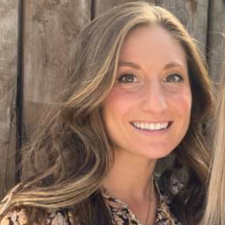On the Road with Feeding Matters
Published by Marissa Dotzler, MS, CCC-SLP on Dec 08, 2022
Feeding Matters is excited to start a new blog segment entitled “On the Road with Feeding Matters.” Pediatric feeding disorder (PFD) affects families all over the country and world. Feeding Matters hopes to end geographic isolation of information and experiences and create a global narrative of share experiences, best practices for care and innovation in the field.

Feeding Matters would like to introduce our very own volunteer and traveling feeding therapist, Marissa Dotzler!
1. Hello Marissa! We are so excited to be starting our “On the Road with Feeding Matters” segment with you at the helm. Tell us a bit about your background and why you chose to go into the feeding therapy world?
Hello Feeding Matters!! I began my education at the University of Delaware where I received my Bachelor of Science in Cognitive Science followed by my Masters in Communication Sciences and Disorders at Adelphi University. I started officially working as an SLP in 2018 after completing my clinical fellowship in 2017. After exposure to the field and all it encompasses, I was immediately drawn to the “feeding therapist” side of it all. There are so many choices and avenues for therapists to navigate and I think for me, finding one to hone in on was important.
It wasn’t always feeding. At first, I thought I would choose an alternative path because feeding therapy seemed scary in all transparency. I quickly learned it was quite the opposite, feeding therapy is dynamic, rewarding, and fun! It brings me so much joy to watch the children and families I work with grow and progress. A mantra I’ve recently been going by is “what are some things, within reason, I’d be excited to do? What are some things I’m afraid to do? What is a place I’d regret never seeing? What is a skill I’ve always wanted to learn?” I will talk about each of these as we continue our conversation as it relates to being a feeding therapist.
2. This idea of being a traveling feeding therapist is so interesting. What made you get involved and interested in this and where have you traveled thus far?
Thank you! I would place this under the “what are some things I am afraid to do” mantra question. Traveling and exploring new cities and places is something I’ve always enjoyed so when I took the time to research travel therapy and realize it united a career I love plus my love for travel. It was a no-brainer. Talking about the idea was a lot easier than making the idea a reality though. Leaving a long-term job in a city I lived in for five years was difficult. Knowing I would be leaving behind friends and families was also scary to embark on this solo journey. I took those fears and ran with them, always knowing they were a phone call away. The other reward is having the ability to connect with new colleagues and help more families than I could have ever imagined! I have been to Philadelphia and Houston, with San Francisco as my current stop!
3. Could you share with us what a normal day looks like for you at work (or if there isn’t a normal day what do you find yourself working on the most?)
It is difficult to narrow down a “typical” day when each day, setting, and environment is so different. Each day always starts with preparation for ongoing patients and new evaluations and ends with documenting the details. The in between is where all the fun happens. The day can range from conversations with colleagues for collaboration or learning new skills, supporting other disciplines, observing a session, and of course getting to play. Each day varies with its responsibilities and check lists, but no matter what, I always find the time with laugh with my clients and families. It is my favorite part of the day; those little moments where we laugh and remember despite whatever they are in the clinic/hospital for, there is this amazing, special, funny child in front of us who can brighten even the dullest moments of the day.
4. What is one of the topics you think you will discuss first?
I think right now a lot of families are still struggling with the ramifications of COVID and either delays or gaps in service. I think it would be relevant to discuss a current issue topic like this one.
5. We know that feeding is a universal idea, but have you seen any differences geographically speaking with your previous placements?
It’s hard to say, not having been to ~many~ places yet. However, I have noticed some areas of the country have a higher prevalence of one disorder over another… which is an interesting observation. More to come on this!
6. Did you learn about PFD or Feeding Matters first? And how did you become involved?
I learned about Feeding Matters first. I was working with another feeding therapist when I was first starting and she mentioned the PFD Conference hosted by Feeding Matters. I signed up that night! I remember being so in awe of the speakers and Feeding Matters Organization, it was such a wonderful event and I knew I had to get involved. I continued to learn and grow my knowledge about PFD through practice, mentorship, and continuing education. Eventually, I signed up to be a volunteer and after my first conversation with you, we landed here!
7. We are so excited to get started with this segment with you, Marissa. Stay tuned for our second blog from San Francisco!
Can’t wait – I am so grateful and excited to be here as a part of the Feeding Matters team!